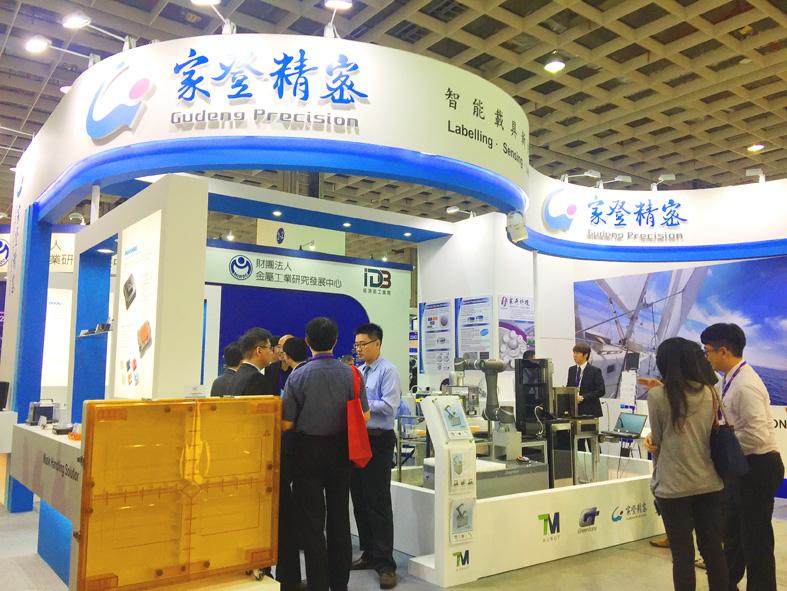Gudeng Precision Industrial Co (家登精密), the sole supplier of extreme ultraviolet (EUV) pods to Taiwan Semiconductor Manufacturing Co (TSMC, 台積電), yesterday said revenue surged 87.75 percent annually to NT$380 million (US$12.76 million) last month, benefiting from its largest buyers’ rapid migration to advanced technologies.
The surge boosted the company’s second-quarter revenue by 76.63 percent to NT$1.07 billion from NT$603.64 million in the same period last year. During the first six months, Gudegn has amassed NT$2.09 billion in revenue, soaring 67.54 percent year-on-year from NT$1.25 billion.
The company attributed the growth to its shipments of EUV pods in the first half of the year.

Photo: Grace Hung, Taipei Times
Gudeng said it has a clear order visibility through next year, adding that all of its front-opening unified pod (FOUP) manufacturing capacity is fully booked, with 70 percent ordered by customers in China.
The box-like FOUPs are used to ship, transport and store 12-inch wafers, which are unloaded from the FOUP within processing equipment to keep the wafers sterile. EUV pods are used to carry reticles when EUV tools are utilized to make chips with cutting-edge process technologies.
“The orders received have surpassed our capacity. The FOUP order visibility extends through to the end of next year,” Gudeng said in a statement.
“Due to supply constraints, some Chinese customers are offering to pay more to secure as much capacity for early delivery,” it said.
Gudeng, based in New Taipei City’s Tucheng District (土城), said EUV pods and FOUPs are two products that have experienced the fastest growth momentum.
With TSMC’s 3-nanometer technology to enter mass production in the second half of this year, Gudeng said it expects its shipments of EUV pods to grow significantly.
Strong customer demand is expected to boost financial performance, the company said, adding that net profit in the first half of this year should exceed last year’s earnings.
The company said it would release detailed results and a business outlook next month.

Macronix International Co (旺宏), the world’s biggest NOR flash memory supplier, yesterday said it would spend NT$22 billion (US$699.1 million) on capacity expansion this year to increase its production of mid-to-low-density memory chips as the world’s major memorychip suppliers are phasing out the market. The company said its planned capital expenditures are about 11 times higher than the NT$1.8 billion it spent on new facilities and equipment last year. A majority of this year’s outlay would be allocated to step up capacity of multi-level cell (MLC) NAND flash memory chips, which are used in embedded multimedia cards (eMMC), a managed

CULPRITS: Factors that affected the slip included falling global crude oil prices, wait-and-see consumer attitudes due to US tariffs and a different Lunar New Year holiday schedule Taiwan’s retail sales ended a nine-year growth streak last year, slipping 0.2 percent from a year earlier as uncertainty over US tariff policies affected demand for durable goods, data released on Friday by the Ministry of Economic Affairs showed. Last year’s retail sales totaled NT$4.84 trillion (US$153.27 billion), down about NT$9.5 billion, or 0.2 percent, from 2024. Despite the decline, the figure was still the second-highest annual sales total on record. Ministry statistics department deputy head Chen Yu-fang (陳玉芳) said sales of cars, motorcycles and related products, which accounted for 17.4 percent of total retail rales last year, fell NT$68.1 billion, or

In the wake of strong global demand for AI applications, Taiwan’s export-oriented economy accelerated with the composite index of economic indicators flashing the first “red” light in December for one year, indicating the economy is in booming mode, the National Development Council (NDC) said yesterday. Moreover, the index of leading indicators, which gauges the potential state of the economy over the next six months, also moved higher in December amid growing optimism over the outlook, the NDC said. In December, the index of economic indicators rose one point from a month earlier to 38, at the lower end of the “red” light.

MediaTek Inc (聯發科) shares yesterday notched their best two-day rally on record, as investors flock to the Taiwanese chip designer on excitement over its tie-up with Google. The Taipei-listed stock jumped 8.59 percent, capping a two-session surge of 19 percent and closing at a fresh all-time high of NT$1,770. That extended a two-month rally on growing awareness of MediaTek’s work on Google’s tensor processing units (TPUs), which are chips used in artificial intelligence (AI) applications. It also highlights how fund managers faced with single-stock limits on their holding of market titan Taiwan Semiconductor Manufacturing Co (TSMC, 台積電) are diversifying into other AI-related firms.